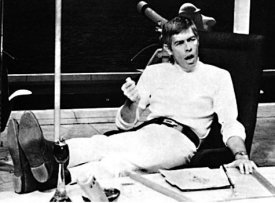

the jazz club
Dave PikeA respected, if little-known vibes player since the late 1950s, Dave Pike's work is well worth seeking out. He was a sometimes sideman to Herbie Mann during the flautist's better Afro-Brazilian period, but also did some remarkable work as a leader. The three best that we've heard are "Jazz for the Jet Set" from 1966 (featuring the young Herbie Hancock on Hammond organ!), "Got the Feelin'" from 1969, and the excellent set from that same year with groovy sitar work on it! It's mix of propulsive vibes and mind-bending sitar are perfect mood-setting music for a party, and eminently danceable, to boot. An EP with new remixes of the main theme from this LP is available, titled "Mathar". It is one of the best dance tunes we have heard - I mean, how can you go wrong with jazz sitar and vibes from 1969?! The Novi SingersWe were entirely unfamiliar with The Novi Singers until we picked up a recent compilation on the Jazzanova label called "Go Right: Jazz from Poland 1963-75". Eleven of the eighteen cuts on it are by a Polish vocal quartet called the Novi Singers, who did great things with close harmony vocalese, over fine, medium-sized ensembles. Quite simply, these are the best jazz vocalese tunes we've ever heard. If you can imagine Lambert, Hendricks & Ross gone Eastern European Beatnik, you have an idea of what The Novi Singers sound like. Adding to its appeal is the almost audible vibe of Tatra-driving Polish intellectuals in berets. The only drawback on this fine sampling is on the two cuts where they attempt to sing in English - the lyrics are goofy and the pronunciation is painful (although we'd do far worse trying to sing in Polish!) If you dig Les Double Ses, The Swingle Singers, The Singers Unlimited or even The Four Freshmen, you owe it to yourself to search out the Novi Singers. Serge GainsbourgGainsbourg is so well-known for his publicity-getting scandals (simulated-sex on record, singing about incest with his daughter, wearing a Nazi Stormtrooper's uniform or dressing in drag) that it's easy to lose sight of the fact that he could also be a brilliant songwriter and effective singer. His output from the late '50s - when he really developed his style as a composer/singer of unusual jazz songs - is in a category by itself. Vamps of strings or horns follow tricky time signatures and complex chord structures, giving the perfect background to Gainsbourg's husky voice. Not speaking French well enough to understand the subtleties of his lyrics, it seems that most of them are about the people of his fictional millieu and their relationships. Probably the best reissues of music from his prime are "Gainsbourg Percussions", "Du Jazz dans le Ravin" and "Le Poinconneur des Lilas". Through the '60s Gainsbourg's sound matured, but as the "youth generation" grew, his focus turned more to novelty and publicity than jazz. On one hand, we enjoy the sillier stuff from the late '60s - '70s, but we also wish he had spent a bit more time with the more sophisticated music; he could've been a French Noel Coward rather than a French Benny Hill. Nonetheless, when at his best, he could deliver a very moving - even harrowing - number, then breeze effortlessly into a groove that would have impressed Sinatra. Much has been said about Serge Gainsbourg, but one thing is certain: no one ever called him "boring". the cabaña the space station the lounge the cabaret the conservatory the concert hall the trip the screening room |